Reason's 2017 Gift Guide
The best books, movies, music, and TV of the year

As 2017 comes to an end, we've asked our staff to select some of the best books, movies, music, and other media released this year. Our picks range from a faux-communist cop show to a history of food and empire, from a collection of evangelical rock songs to a novel set on the moon—plus items about biodiversity, mythology, political partisanship, pro wrestling, and more. —Jesse Walker
Ronald Bailey
Science Correspondent
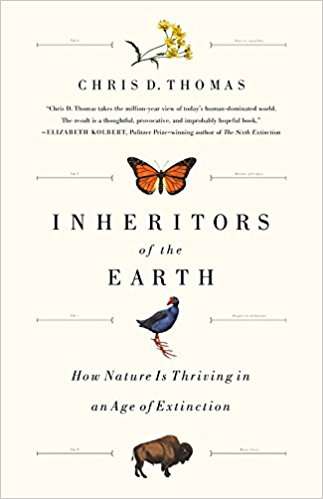
Humanity isn't destroying the natural world; we're changing it. In many ways, our changes are creating richer and more vibrant ecosystems.
That's the persuasive and liberating argument advanced by the York University conservation biologist Chris D. Thomas in his riveting new book, Inheritors of the Earth: How Nature Is Thriving in an Age of Extinction. "It is time for the ecological, conservation and environmental movement—of which I am a life-long member—to throw off the shackles of pessimism-laden, loss-only view of the world," he writes. As an increasingly wealthy and more technologically adept humanity continues to withdraw from nature, Thomas shows, wild creatures are returning to landscapes from which they once had been extirpated. This trend will strengthen as the 21st century unfolds.
Humanity is also creating a new Pangaea by moving thousands of species around the globe and thereby increasing local biodiversity almost everywhere. For example, New Zealand's 2,000 native plant species have been joined by 2,000 from elsewhere, doubling the plant biodiversity of the islands. As plants and animals populate new regions, they start down different evolutionary paths that are already differentiating into new species. Meanwhile, only three of New Zealand's native plants have gone extinct.
Thomas cogently argues that a thriving world of exotic ecosystems and biological renewal is at hand. By the time most readers have finished this well-written and carefully researched book, they should agree.
Eric Boehm
Reporter

If the best album of the year is the best album to sing along with on a long road trip—and isn't it, really?—then the contest isn't even close in 2017. Japandroids' Near to the Wild Heart of Life is itself a road trip: one that reverses a rock 'n' roll cliché by aiming ever homeward, hungry for a love left behind.
Neither robots nor Japanese imports, Japandroids take us on an alliterative ride from the noise of a New York night to the sweltering stink of a sinking city (New Orleans). The album's third track deserves a place on the admittedly short list of libertarian love songs for its title alone ("True Love and a Free Life of Free Will"), if not for its hazy scenes of cabarets and cantinas full of cigarette smoke, through which guitarist Brian King ruminates that love is the joining of mutual passions. "And I'll love you, if you love me," he sings—a punk rock version of a wedding vow.
The Canadian duo's followup to 2012's Celebration Rock is more reflective lyrically and more experimental musically than its predecessor. The screaming guitar loops and hammering drums of the band's earlier work is still here in places, but King and drummer David Prowse pull out their synthesizers and slow the pace a bit in the middle of the album, as if giving their fans a moment to catch their breaths before another bombastic singalong. It works, and it's particularly enjoyable live, where screaming along to the driving chorus leaves you feeling like hitting the open road.
Elizabeth Nolan Brown
Associate Editor
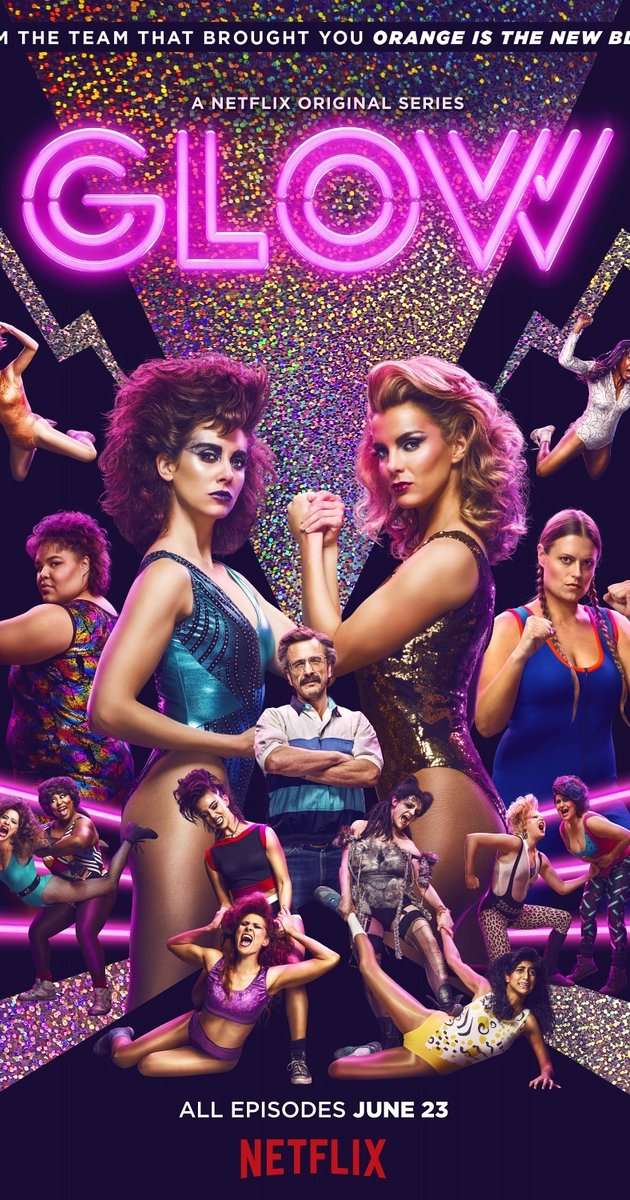
"Fake" is our president's favorite rallying cry. "Feminism" is Merriam-Webster's word of the year. Devious Russians dominate half the country's political fears. Passionate fights rage over "political correctness" and cultural representation. In this atmosphere, GLOW—a campy, hilarious, and heartwarming Netflix series about women's wrestling in mid-'80s Los Angeles—hardly seems like a historical piece at all, at least if you can look beyond all the big hair and legwarmers. But somehow the veneer of yesteryear allows it to tackle these topics in a way that's funny and smart without feeling heavy-handed.
A fictionalized account of the rise of the real Gorgeous Ladies Of Wrestling program (syndicated from 1986 to 1990), GLOW follows a down-on-his-luck cult director, Sam Sylvia (comedian Marc Maron), as he assembles a ragtag team of actors and misfits for the production, bankrolled by an eager but clueless rich kid (Chris Lowell). His nemesis and salvation comes in the form of precocious wannabe actress Ruth Wilder, played perfectly against type by perennial sweetheart Alison Brie, and her best frenemy Debbie (Betty Gilpin), a hot blonde soap-opera star with a philandering husband and burgeoning ambitions beyond being a sex symbol. Debbie and Ruth work out their personal drama while learning to faux-kick the shit out of each other as patriotic cutie "Liberty Belle" and the dastardly communist "Zoya the Destroyer."
Sylvia gives all of the GLOW ladies ridiculous and—from a literalist lens—highly offensive personas to play in the ring, and the way the show addresses this leaves room for lots of humor and some subtle social commentary. It also gives the show's amazing ensemble cast room to shine. The standouts include Sunita Mani (best known from Mr. Robot) as a pre-med student who transforms into "Beirut the Mad Bomber" for the cameras; Britney Young as the stage-fright-stricken Carmen "Machu Pichu" Wade, the only one with actual wrestling skills; Kate Nash as the ditzy but enthusiastic British beauty Rhonda; and actual pro wrestler Kia Stevens as Tamme Dawson, who initially rejects being cast as the villainous "Welfare Queen" before beginning to have fun with it and ultimately stealing the show.
Brian Doherty
Senior Editor

Bob Dylan is notorious for alienating his fan base, but the reaction to his mid-'60s move from acoustic folk to electric blues-rock had nothing on the incredulity and anger that greeted the singer-songwriter when he donned the mantle of an apocalyptic, moralistic born-again Christian from 1979 to 1981.
With Trouble No More, the 13th installment of Columbia Records' revelatory "Bootleg Series" of archival-dig Dylan releases, we have a new chance to reconsider that period. The collection also gives us further evidence that Dylan long ago lost the instinct to know his own best work. Not only does his ferociously passionate live band give songs we already knew from Dylan's studio albums a more punchy and vivid life, but this set includes more than 10 originals that never appeared on official Dylan LPs before. Most are top-flight Dylan, especially "Ain't Gonna Go to Hell for Anybody" and "Making a Liar Out of Me."
Dylan's themes remained the same: love and justice, just seen through a more deliberately traditional lens. The consistent toughness and ferocity of the music matches the toughness and ferocity of his message of earthly depravity overcoming courage and wisdom (and vice versa). You needn't agree with that gospel message to be moved by a passion and presence of performance up there with any in his storied career. This set—particularly the generous eight-CD/one DVD "deluxe" edition—will be forevermore the place to go for these songs, even as the historically minded fan regrets the producers' decision to excise the wild sermons he peppered into his live sets during this era.
Nick Gillespie
Editor, reason.com and Reason TV
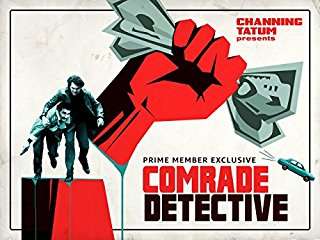
The Cold War may have ended a couple of decades ago, but its legacy lives on through Amazon Prime Video. This year the streaming service debuted Comrade Detective, "the greatest '80s Romanian detective show you've never seen," a fake Iron Curtain buddy-cop show featuring hilarious lip-synching by Joseph Gordon Levitt, Channing Tatum, and other American actors. The detectives prowl Bucharest in search of black-market Jordache jeans and a serial killer wearing a Ronald Reagan mask while characters spout ideological clichés. "Not even the excellent Romanian health care system can help him now," muses a doctor upon finding a patient who has hung himself in a hospital room. More than merely mocking the Ceausescu regime, the show forces us in post-communist America to reconsider how jingoism infused our popular entertainments as well.

Amazon's streaming service also offers up all five seasons of The Americans, the critically acclaimed dark comedy-drama that follows two Soviet sleeper spies posing as travel agents and raising a family in suburban D.C. during the 1980s. Any show that features a scene where an undercover commie and his FBI agent neighbor carpool to est seminars is a few clicks beyond must-watch TV, especially since the sixth and final 10-episode season of The Americans is set to air in early 2018.
Each of these shows is a smart, irreverent reconstruction of a recent past that has already disappeared down the memory hole faster than a post-purge commissar in 1930s Russia. Drawing viewers in with good-natured nostalgia, they teach us valuable lessons about the moral costs of politicizing all aspects of life, a tendency that has ironically grown stronger in the United States since the end of communism.
Ed Krayewski
Associate Editor

"I'm trying to give you a million dollars' worth of game for $9.99," Jay-Z raps in "The Story of O.J.," the Grammy-nominated opening track on the Grammy-nominated 4:44.
4:44 is a celebration of Jay-Z's successful career, which means it's a celebration of free enterprise. Jay-Z certainly understands how markets have made his successes possible, and he has advice for those who'd like to be successful too. On "The Story of O.J." alone, he bemoans the fact that he spent his early riches on new cars instead of property in his native Brooklyn, he dismisses younger rappers who flaunt their wealth in Instagram photos ("we don't call that money over here"), and he warns that credit is more important than spending money at a strip club.
On the closing track, "Legacy," Jay-Z explains that the legacy that matters to him is his children and the intergenerational wealth he is building for them. Like many of the goals and values in the album, that's something we all could strive to.
Mark Lisheron
Managing Editor, reason.com

Lady Bird is a reassuring reminder that not all movies are derived from comic books or from other movies, and that people will pay cash money to see really fine actors playing real people interacting with other real people.
The first film directed by the estimable actress Greta Gerwig, Lady Bird is a somewhat autobiographical depiction of her final year at a Sacramento Catholic high school in the early 2000s. Not since Boyhood (which I will shamelessly point out includes a brilliant non-speaking turn by my son Sam) has a movie so perfectly captured the average American family in all its ferocious banality.
Christine "Lady Bird" McPherson (Saoirse Ronan) spends her last year before heading to an East Coast college facing off with her mother (Laurie Metcalf) and seeking refuge in her father (Tracy Letts). The mother-daughter exchanges are so raw and lacerating you feel a little embarrassed eavesdropping on them.
The movie is just as real when it's being funny, which is often. And Gerwig has gone out of her way not to draw attention to the many moments of genuine insight.
When Lady Bird meets with her principal to discuss her college application essay, an insincere love note to a city she's desperate to escape, Sister Sarah Joan (a wonderful Lois Smith) tells her, "It's clear how much you love Sacramento."
When Lady Bird replies, jollying her along, "I guess I pay attention," Sister Sarah Joan responds, quietly and depthlessly, "Don't you think they're the same thing?"
Katherine Mangu-Ward
Editor-in-Chief

Obviously, I want to go to the moon—at least for a vacation, and possibly as an émigré. But since at least 2007, modern space tourism companies always seem to be 18 months away from their first commercial launch.
In the meantime, thank goodness I have Andy Weir's cheerful, realistic novel Artemis to help me imagine what my lunar life would be like. Weir's The Martian was turned into a blockbuster movie starring Matt Damon as an biologist stranded on Mars. Artemis is set on the moon, where tourists bumble around on the site of the Apollo landings while the real action takes place among the full-time residents. The new book features the same pulse-pounding will-our-hero-run-out-of-oxygen MacGyverific scenes you remember from The Martian, but they're set in a more fully realized near-future world with politics and economics all its own.
To learn more, go check out my interview with Weir for the Reason Podcast.
Jacqueline Pyke
Director, Strategic Initiatives
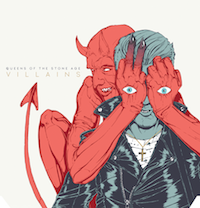
Villains is the seventh album by Queens of the Stone Age, a group that established its credibility as a rock nerd's rock band with the brutal and sneaky-funny Rated R, its second album, released in 2000. Since then, frontman Josh Homme (a self-described "fallen libertarian" who says he's "very socially liberal, but I don't think the government knows what to do with your money better than you do") has taken the band in many musical directions while spinning off several side projects.
With Villains, Homme took a risk with long-term fans, choosing to work with the pop-funk producer Mark Ronson. Ronson's subtle influence makes Villains a bit more danceable than the group's previous releases, but the album is packed with the kind of dramatic bridges, haunting ballads, and turn-up-the-volume crescendos that QOTSA fans have come to expect.
Mike Riggs
Reporter

English laborers of the late 18th century subsisted mostly on a miserable diet of potatoes, weak tea, and dry bread. A decent hunk of meat, Lizzie Collingham relates in The Taste of Empire, was a Christmas luxury if it could be afforded at all. Of all the upgrades laborers pined for, meat topped the list. When New Zealand's earliest British immigrants reported back to their friends in England that they could afford to eat meat not just every day but at every meal, migration to the island exploded.
Most Americans know that Europeans traveled to the New World in search of gold and religious freedom; Collingham reveals the extent to which it was the prospect of abundant food that enticed Europeans to set sail for strange lands and new lives. The Polish phrase for emigration, writes Collingham, is za chlebem. It does not mean "to move" but "to bread."
Explorers who thought New World gold would bolster the coffers of Old World governments were half right. By the end of the 19th century, entrepreneurs in Argentina and the United States had pioneered the practice of cold storage, which allowed them to ship beef and lamb across the Atlantic without first stuffing it into a can (invented just a generation before).
The subtitle of Collingham's book is How Britain's Quest for Food Shaped the Modern World. Many historical writers these days insist their field of study provides the ideal lens for understanding history, but Collingham actually makes good on the claim. Africa's contemporary problems with food insecurity make far more sense when you learn about Britain's boneheaded agricultural planning in colonial Africa; the global rise in obesity, meanwhile, traces back to British sugar cane plantations in the Caribbean and the invention of canning. I devoured The Taste of Empire in half a dozen sittings, and I'd happily go back for more.
Scott Shackford
Associate Editor

As long as there have been myths about gods, there have been tales of divine beings toying with fragile human lives for their own purposes. The television series American Gods, adapted from Neil Gaiman's novel of the same name, brings that idea into a modern setting.
The human being stuck in the center of this struggle is Shadow Moon (Ricky Whittle), a charming con man whose prison sentence for a failed job ends early when his wife is killed in a car accident. He finds himself in the employ of a fellow con with the unlikely name of Mr. Wednesday (Ian McShane) and a mysterious agenda requiring a road trip across the United States. Mr. Wednesday is not what he seems, and his name is more than a hint of his true identity.
Across the eight-episode first season of the series, Shadow Moon is slowly introduced to a conflict between the gods of cultures long past and the supernatural personifications of more modern forms of "worship": technology, global commerce, the media (portrayed by Gillian Anderson as a parade of celebrity impersonations). Mythical creatures of yore, like leprechauns and djinns, have adapted to the modern world as well.
American Gods isn't just a singular story about an old god's mad quest to turn back time. It's a look at the complex mix of cultures, journeys, and mythologies that over the course of centuries built America.
Jesse Walker
Books Editor
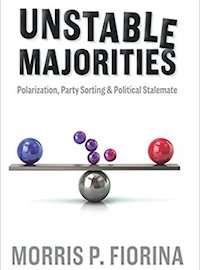
"Political journalists need to realize that nearly everyone they talk to is abnormal—abnormally interested, abnormally well informed, abnormally opinionated," the Stanford political scientist Morris Fiorina writes in Unstable Majorities, a bracing corrective to the conventional wisdom about political partisanship. It is true, Fiorina tells us, that the political class has been getting steadily more polarized over the past few decades. But the political class comprises less than a fifth of the country. Outside that small world of Red Team and Blue Team enthusiasts, most Americans hold a mishmosh of views; it isn't unusual for public opinion to grow more liberal in one area at the same time that it trends to the right in another.
"Voter behavior does not change much," Fiorina argues, "because the alternatives voters face do not change much. Most voters, however, are not as well sorted as party elites and many voters do not identify with the parties at all; hence, they are increasingly dissatisfied with the choices the party system offers."
Those unsatisfied voters deliver outcomes that manifest themselves as maps rendered in two colors, so we hear a lot about those two vast oversimplifications, "Red America" and "Blue America." In this engaging and historically informed account, Fiorina reminds us that the electoral map is not the territory.


Show Comments (22)